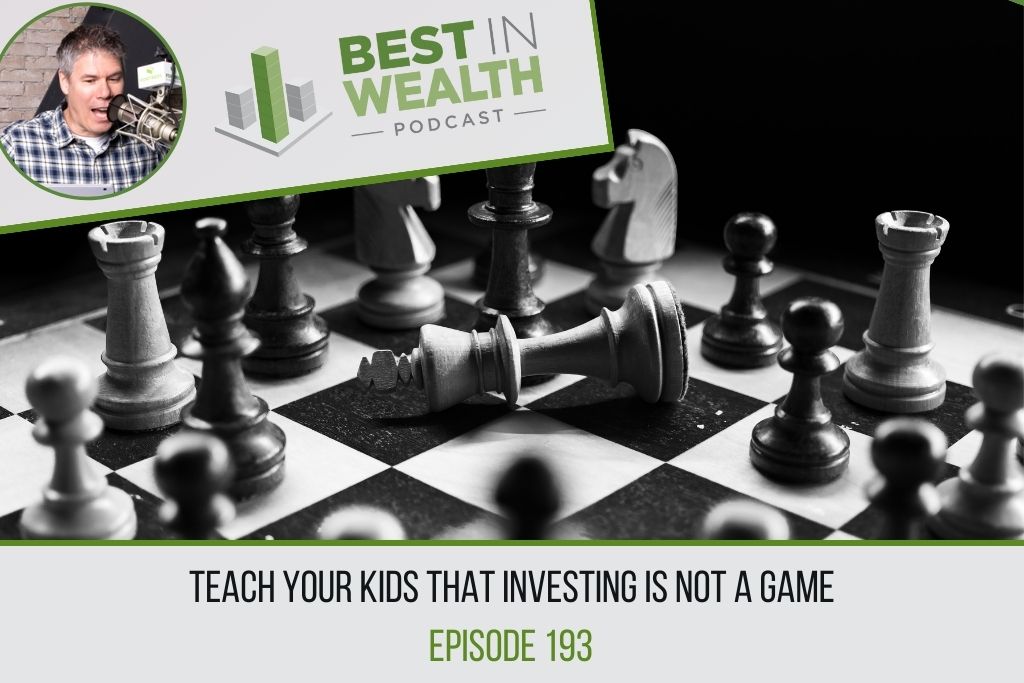Teach Your Kids that Investing is NOT a Game, Ep #193

As a family steward, it is not only important to teach your kids how to invest—but that investing is not a game. With the surge of meme stocks that have gained cult-like popularity, it is easy to get caught up in the rat race. But buying one-off stocks is not the role of a family steward. So what does good investing look like? What should family stewards avoid when it comes to investing? Listen to this episode of Best in Wealth to hear my thoughts!
Investing is NOT a game—so why are people investing in meme stocks? Learn how to teach your kids that they must invest carefully in this episode of Best in Wealth. #wealth #retirement #investing #PersonalFinance #FinancialPlanning… Click To TweetOutline of This Episode
- [1:08] Being a family steward is hard
- [4:58] The popularity of meme stocks
- [10:40] Why individuals cannot beat the average ROR?
- [15:32] What good investing looks like
- [18:28] Your job as a family steward
The rise of meme stocks
Have you heard of meme stocks? Meme stocks refer to shares of a company that have gained a cult-like following online through social media platforms. They can also be defined as shares of a company that has seen a recent surge in viral activity, fueled by platforms like Reddit and Twitter. The viral nature prompts retail traders to buy the stock with the knowledge that its share price will likely rise. GameStop was—and still is—the most popular meme stock. We have been conditioned to see these investors in opposition to Wall Street. They want to “Stick it to the man.”
But retail investors and Wall Street actually have a lot in common. They both want to beat the market. They want to buy low and sell high. But Wall Street stands to make a lot of money off of meme investors because of trading costs. Many companies offer free trades. However, there are other costs involved. When was the last time Wall Street gave anything away for free? It is all a spin.
A long-term investment strategy has little to do with picking the right stocks and everything to do with investing in human ingenuity. Human ingenuity is the engine that drives the stock market. The anti-wall street revolution is not meme investors. It began in academia in the 1960s and evolved into the formation of index funds. The first retail index fund came on the market in 1975. The academics found no compelling evidence that any individual can consistently beat the market, which averages a 10% return per year.
What does the rise of meme stocks teach us about investing? I share my thoughts in this episode of Best in Wealth! #wealth #retirement #investing #PersonalFinance #FinancialPlanning #RetirementPlanning #WealthManagement Click To TweetWhy individuals cannot beat the average rate of return (RoR)?
But why do individuals have such trouble beating the average RoR of 10% per year? In transparent stock markets, enormous numbers of buyers and sellers come together to trade. Each side has to feel like they have received a good deal, right? If someone sells me Apple stock, they think selling is the right thing to do. I think buying is the right thing to do. If people did not feel like this, they would not trade.
But no one knows the real intrinsic value of any company at any given time. There are too many factors to consider. That is why we say stocks are priced fairly. If you or your child bet on individual stocks, you might win—but you might lose. And you are unlikely to harvest better returns than if you invested in the whole market. That is what your kids need to learn.
Markets respond to all new available information that comes in every day. The new price reflects the new information that just came out. Nobody knows when a stock will go up or down. It is a fact everyone needs to acknowledge. This is contrary to what Wall Street and meme investors want you to think. There is no algorithm to predict the future.
When Wall Street or meme investors want to capitalize on pricing, they are betting against human ingenuity: the millions working hard to maximize the value of their company. I do not call what they are doing investing. At best it is speculation but in truth, it is gambling.
What good investing looks like
At Fortress Planning Group, we use history and academia to tilt our portfolios into areas that have proven to give us better returns when held for long periods of time. We stick around during the good times and bad times. Buying the market—a highly diversified portfolio of thousands of companies—is not picking stocks. It is investing in human ingenuity to maximize the value of public companies. They adapt to improve products. They create new processes. They solve problems.
While we cannot predict what any one person will do on any day, we can predict that humanity will persevere. The stock market reflects this simple truth. This is the heart of our investment philosophy. Listen to the whole episode for some sage investment advice.
What does good investing look like for a family steward? I share my thoughts—from years of experience—in this episode of Best in Wealth! #wealth #retirement #investing #PersonalFinance #FinancialPlanning #RetirementPlanning #WealthManagement Click To TweetConnect With Scott Wellens
- Schedule a discovery call with Scott
- Send a message to Scott
- Visit Fortress Planning Group
- Connect with Scott on LinkedIn
- Follow Scott on Twitter
- Fortress Planning Group on Facebook
Audio Production and Show notes by
PODCAST FAST TRACK
https://www.podcastfasttrack.com
Podcast Disclaimer:
The Best In Wealth Podcast is hosted by Scott Wellens. Scott Wellens is the principal at Fortress Planning Group. Fortress Planning Group is a registered investment advisory firm regulated by the Securities Act of Wisconsin in accordance and compliance with securities laws and regulations. Fortress Planning Group does not render or offer to render personalized investment or tax advice through the Best In Wealth Podcast. The information provided is for informational purposes only and does not constitute financial, tax, investment or legal advice.



